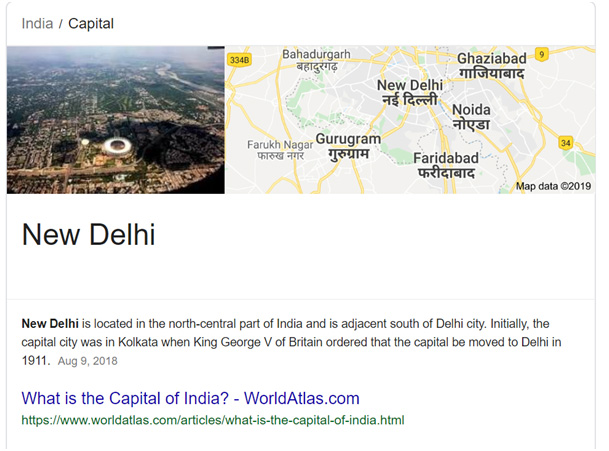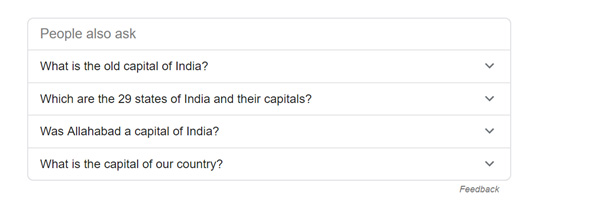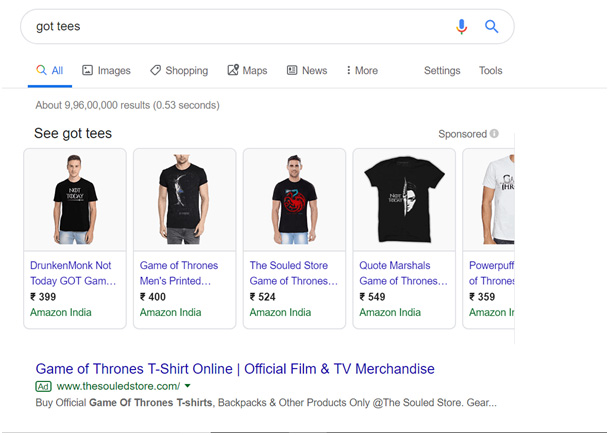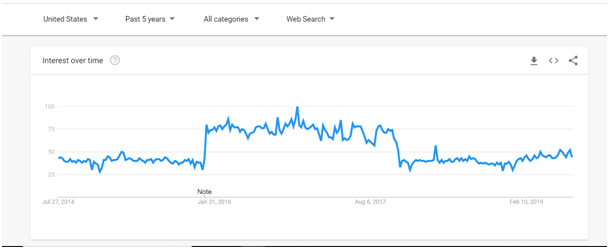THE DEATH OF GOOGLE SEARCH TRAFFIC AND WHAT IT MEANS FOR MARKETERS
One of the hardest things to do is to make things simple.Companies have made a fortune trying to make life easy. But making things easy come at a cost. Couple that with the rapid innovation and companies trying to jump on the bandwagon, technologies powering these businesses rarely remain the same.
So where does it lead us?While Google’s main priority remains to provide a smooth experience to users, it can inadvertently land others at crossroads with them–especially if you are trying to rank yourself in the results.
Google’s search traffic is slowly fleeting away, ubiquitously, from all the competing websites trying to woo themselves into #1 page.
How Did We Get Here?
Let’s turn the clock back a little bit.There’s a reason why Google is successful, and more importantly, still relevant. They know how and when to adapt to the changing technological landscape.But two of the monumental shifts they brought to their algorithm were:
- Implementing the Hummingbird Algorithm
- Implementing Machine Learning Technologies
While Hummingbird is a thing of past, Machine Learning is something Google is trying to shape their technologies around.
Hummingbird
For the longesttime, Google based its search prowess on keywords while trying to match exact terms with web-pages across the internet. This strategy made users stuff keywords into their content just for the sake of ranking, even if the content stays irrelevant. There were, in fact, people who specialized in activities like this: Black hat SEO. These were specialists who used shady techniques to rank betterby:
- Adding keyword-rich content at the end of a page and making it the same color as that of the background!
- Also, people used to buy thousands of backlinks from different websites, as Google used to rank pages by the number of websites that point to a certain page.
In the end, the user’s experience was compromised upon. To tackle this, Googlebrought a significant update in the form of the Hummingbird update. They started focusing on ideas conveyed by the search terms more than focusing precisely on words. This update was a shift in Google’s perspective: to look at ideas and entities and the relationship between them.
Since fewer people looked for short keyword terms and instead went for longer keyword terms (like how they conversed in everyday life), Google tried to shift its strategy to conversation search. They wanted to know what each of the search queries from the user meant.
Machine Learning
As Google implemented the Hummingbird Algorithm, they wanted to know their users and serve them better. And then right in their way, machine learning came in itsway!They had acquired artificial intelligence company DeepMind back in 2014 for a whopping $500 million. ML has helped them learn and provide content in more dynamic ways vis-à-vis earlier times. Coupled with AI, they can now collect, analyze, and present data to different users across different platforms.
Bottom-line being Google can adapt to changing platforms, devices, and locations easily, thereby, delivering more accurate results. Additionally, Machine Learning helps Google right where they want it to: to understand conversational search and how the real world communicates, which Hummingbird set to do. So where does this lead us as users?
Google wants to be your one-stop Solution
Google wants to make people’s lives easy. And one way it can do is to provide you relevant data. They want to remove the burden from the user’s shoulders of personally going through each of the search results. With AI and ML, Google now skims through the data and provides you exactly what you are searching for. Let’s take a simple example.I open up Google, to look for a simple query, i.e., what is the capital of India? But even before I complete my search terms, Google has already predicted the question as well as the answer to what I expect to see.

To make it more immersive, Google provides these information boxes, so that you can have a direct answer to what you are looking forward to.

It also offers other suggestions in the form of questions and answers. So even if you start asking one question, you can get multiple related queries cleared. And the best part? Everything is concise and to the point. You don’t have to take the effort to even go to the website when everything is right at your fingertips.

As a search engine user, I cannot be more than delighted for this my convenience. It helps me save time and even know more suggested questions.But from a website owner’s perspective who is trying his/her very best to rank, this makes the entire process futile. Even if you do manage to land on the first page, Google’s priority would be to provide information in the most convenient manner. And what’s more convenient than providing what they need, right upfront?This trade-off between convenience and search results has left website owners in a tough spot. Users are provided what they want in a jiffy, and they no longer have to try visiting individual links to find what they want.
This interchangereflects in statistics as well: 49% of Google search traffic doesn’t register a single click.It is surely a very daunting study for people trying to rank on page #1. To make matters worse, they have their own sponsored offerings through these infoboxes and their own sponsored links thatconsumesa huge chunk of space. If you were to look for something commercial, you are most likely to be greeted with suggestion boxes such as this. And alongside, top 3-4 links are usually sponsored—which is not their fault as well, since they need a source of revenue as well.

Furthermore, two additional statistics prove that organic space is getting shortenedas we speak.
- Pushing 4 AdWords ads on commercial search push genuine ranking searches down the list and further to latter pages [source]
- Average search results displayed on pages on both mobile and web platforms has decreased [source]
So even while ranking page #1, chances of you getting actual organic search traffic has reduced significantly. Even if you look for the trend for SEO in the United States, you can spot a significant decrease in interest over the years.

Then where is Google engine traffic going?
The Onslaught of Voice Search and Mobile Search
Let’s agree when Dylan croons ‘the times, they are a-changing’. Mostly how you communicate with Google. More people are shifting away from traditional web-based searches to voice commands and instant mobile searches.Both of these factors change the equation and shift the balance a whole lot.
Mobile Search
People carry their technologies to their bed. They might not take their web clients, but they indeedtake their phones with them. In May of 2015, one breakthrough event happened: mobile users overtook desktop users. Although very few websites had mobile-friendly websites, Google tried their best to make queries look more responsive across different platforms.
Cut to 2018; Google decided to take a stand and officially launch an algorithm focused on mobile-first indexing. What this meant was Google would prioritize looking for keywords on the mobile version of websites rather than their desktop counterparts.To add to this, they added another factor while ranking websites: i.e.,mobile page speed. So how fast your site is getting accessed across different devices plays a significant part.
Google in the process of introducing a new co-factor of ranking pages, effectively hampered other traditional factors people exploited to rank on Google Web pages.
Voice Assistants
What makes the entire limelight from Google’s result page are voice assistants: the next big thing.
Users, and especially marketers, haven’t got a clue on how this technology will shift the power balance. With the coming of Google Home and other Alexa-like devices, people now no longer required to even search.
Google wants to make life easy, but it can’t make everybody that depends on the search engine happy at the same time. With convenience to one part of your users, it is always at the cost of something else from another part of your users.
A few more mind-numing numbers to chew on:
- By 2020, 30% of the searches will not require a screen [source]
- Compared to text-based searches and local-area searches, mobile-based searches are to soar 3 times more [source]
So where does this lead you, my fellow Internet Marketer?
The Game is Changing
And, so should you.
There are two ways you should start formalizing your strategies to stay afloat. To deal with and without depending on search results.
Without Search Results
- Since Google has already started occupying more of the result page with their offerings, you now know the click-through rate will be less than earlier. But at the same time, the users who do come through,have a higher chance of converting into your customers. You can leverage this opportunity to increase your conversion rate.
- Diversify your offerings: Rather than sticking to traditional Google searches, you can shift your bases to offer podcasts and YouTube videos. These offerings will add up to providing more content to your users, increasing the conversion rate.
With Search Results
- More Q&A based posts: It is clear that Google now prefers content in the form of question and answers to display through their infoboxes. Crafting your content in such a manner that it answers a certain question subtly can help you rank high and bring in more users.
- Getting their attention through better commercial offerings: Google for all of its worth can’t make their homepage 100% sponsored and paid. Usually, commercial offerings with better images get ranked high, compared to typical search results. You can leverage this opportunity by images that get their eyeballs.
What’s next?
We are at the crossroads of old technologies dying and new technology taking its place. Not many people get to see the point where the landscape is changing, and anything is possible. While it’s one of the most vulnerable to face as an Internet Marketer, if sailed properly it can pay you large dividends of your efforts.
